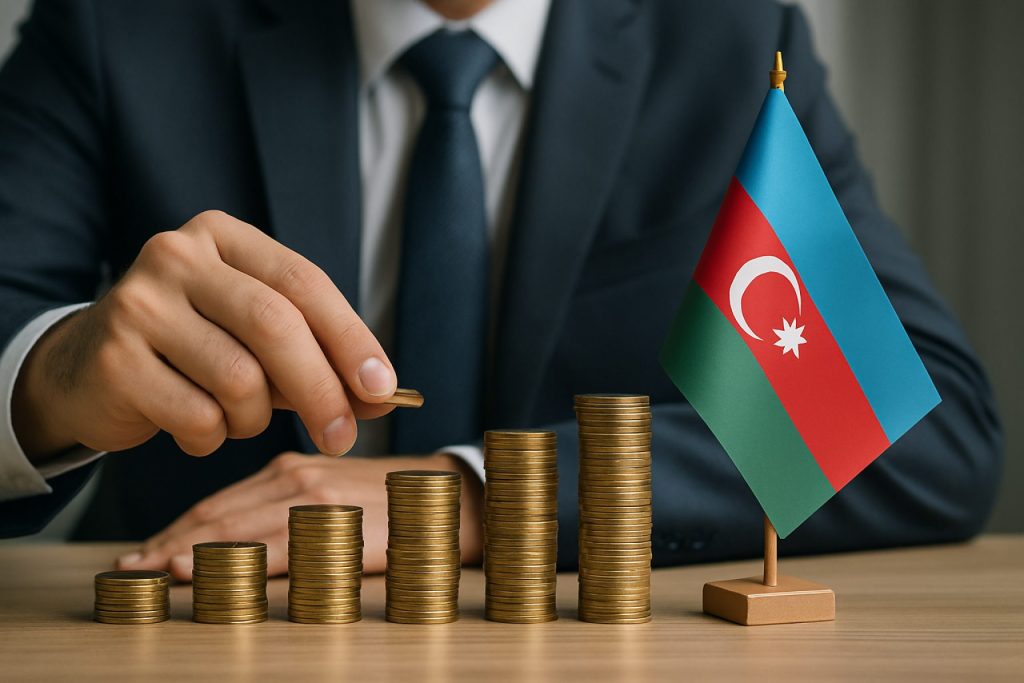
Table of Contents
- Executive Summary: Azerbaijan’s Investment Landscape in 2025
- Macroeconomic Overview: Key Indicators and Growth Drivers
- Top Sectors for Foreign Investment: Oil, Gas, Agriculture, and Beyond
- Legal Framework and Taxation: Laws, Incentives, and Compliance Essentials
- Navigating Regulatory Compliance: Licensing, Reporting, and Local Rules
- Investment Incentives and Free Zones: Benefits for International Investors
- Key Government Initiatives and Infrastructure Projects
- Risks and Mitigation: Political, Economic, and Operational Considerations
- Case Studies: Recent Investment Success Stories (Source: invest.gov.az)
- Future Outlook: Projections, Trends, and Strategic Recommendations for 2025–2030
- Sources & References
Executive Summary: Azerbaijan’s Investment Landscape in 2025
Azerbaijan’s investment landscape in 2025 stands at a pivotal juncture, shaped by robust economic reforms, regional connectivity ambitions, and a drive for diversification beyond hydrocarbons. The government continues to prioritize foreign direct investment (FDI) as a core pillar for economic modernization, underpinned by legislative reforms and streamlined compliance procedures to attract international capital. In 2023, FDI inflows reached approximately $6.2 billion, reflecting sustained interest in sectors such as energy, infrastructure, agriculture, and information technology (State Statistical Committee of the Republic of Azerbaijan).
Azerbaijan’s legal framework for investment is anchored in the Law on the Protection of Foreign Investments (in force since 1992), which guarantees equal treatment for foreign and domestic investors and provides safeguards against unlawful expropriation (Milli Majlis (Parliament) of the Republic of Azerbaijan). Ongoing legislative updates in 2024–2025 are expected to further streamline the investment climate by simplifying business registration, enhancing contract enforcement, and introducing new incentives for priority sectors such as renewable energy and digital infrastructure (Ministry of Economy of the Republic of Azerbaijan).
Compliance requirements for foreign investors are guided by transparent tax regulations, anti-corruption measures, and sector-specific licensing. The government has accelerated digitalization of procedures through the “Single Window” system, reducing administrative barriers for company registration, customs, and permits (State Tax Service under the Ministry of Economy). Additionally, Azerbaijan is a member of the Multilateral Investment Guarantee Agency (MIGA), providing investors with political risk insurance and further confidence in dispute resolution (Multilateral Investment Guarantee Agency).
Key statistics underscore Azerbaijan’s favorable investment environment: GDP growth is projected at 2.8% for 2025, driven by non-oil sectors, while inflation is forecast to remain below 5% (Central Bank of the Republic of Azerbaijan). The government’s 2030 Vision targets an increase in FDI to $8 billion annually, with a focus on manufacturing, logistics, and green energy (President of the Republic of Azerbaijan).
Looking ahead, Azerbaijan’s strategic location at the crossroads of Eurasian transport corridors, coupled with a stable regulatory environment and proactive government support, positions the country as a competitive destination for regional and global investors through 2025 and beyond. Continued legal reforms and infrastructure investments are expected to further enhance the investment climate and unlock new growth opportunities.
Macroeconomic Overview: Key Indicators and Growth Drivers
Azerbaijan’s macroeconomic landscape in 2025 offers a dynamic environment for investors, shaped by energy sector performance, ongoing structural reforms, and efforts toward economic diversification. The country’s gross domestic product (GDP) grew by an estimated 5.5% in 2023, buoyed by robust oil and gas exports, and preliminary data suggest the economy will maintain positive momentum through 2025, albeit at a moderated pace as global energy prices stabilize and non-oil sectors expand Ministry of Economy of the Republic of Azerbaijan.
The oil and gas sector remains the primary engine of economic activity, accounting for over 87% of export revenues and around 50% of budget income. However, Azerbaijan has accelerated its focus on diversifying away from hydrocarbons. Government-led initiatives under “Azerbaijan 2030: National Priorities for Socio-Economic Development” target increased investment in agriculture, information technology, renewable energy, and logistics President of the Republic of Azerbaijan. Notably, the renewable energy sector is projected to attract over $2 billion in foreign direct investment by 2027, supporting the government’s aim to generate 30% of electricity from renewables by 2030.
Inflation is expected to remain within the Central Bank’s 2–6% target range, following a peak of 13.9% in 2022 and subsequent tightening of monetary policy. The exchange rate of the Azerbaijani manat (AZN) has remained stable due to strong foreign currency reserves and prudent financial management Central Bank of the Republic of Azerbaijan. The government debt-to-GDP ratio stands at approximately 13%, considered low compared to regional peers, enhancing Azerbaijan’s macroeconomic resilience.
Azerbaijan’s legal framework continues to evolve in support of a more favorable investment climate. The Law on Investment Activity, effective from January 2024, introduces clearer investor protections, streamlined dispute resolution, and incentives for priority sectors. Ongoing reforms aim to align with international standards and improve transparency, with a focus on digitalization of government services and simplifying business registration Ministry of Digital Development and Transport of the Republic of Azerbaijan.
Looking ahead, sustained government investment in infrastructure, the continued opening of the Karabakh region for economic activity, and closer integration with regional transport corridors (notably the Middle Corridor initiative) are expected to underpin Azerbaijan’s growth prospects. These factors, combined with a stable macroeconomic environment and ongoing legal reforms, position Azerbaijan as an increasingly attractive destination for foreign investment through 2025 and beyond.
Top Sectors for Foreign Investment: Oil, Gas, Agriculture, and Beyond
Azerbaijan’s investment landscape in 2025 continues to be shaped by its natural resource wealth, strategic location, and ongoing economic diversification initiatives. The government’s focus remains on attracting foreign capital into priority sectors, notably oil and gas, agriculture, and increasingly, non-oil industries such as ICT, tourism, and renewable energy.
- Oil and Gas: The energy sector remains the cornerstone of Azerbaijan’s economy, accounting for over 90% of export revenues in recent years. Large-scale projects like the Southern Gas Corridor have cemented Azerbaijan’s role as a major energy supplier to Europe. The State Oil Company of Azerbaijan Republic (SOCAR) continues to partner with global firms under production sharing agreements (PSAs), which provide legal and tax stability for foreign investors. The government has reaffirmed its commitment to honoring these agreements, and regulatory oversight is provided by the Ministry of Energy of the Republic of Azerbaijan.
- Agriculture: Recognizing the sector’s potential for employment and export diversification, the government offers tax incentives and subsidies to foreign investors in agriculture. As of 2025, foreign-owned entities can lease land and benefit from customs duty exemptions on imported equipment. Oversight and policy development are managed by the Ministry of Agriculture of the Republic of Azerbaijan. In 2023, agriculture accounted for approximately 6% of GDP, with growth expected to accelerate due to modernization initiatives.
- Non-Oil Sectors: Azerbaijan’s export and investment promotion agency (AZPROMO) actively encourages foreign direct investment in ICT, tourism, logistics, and renewable energy. Special Economic Zones (SEZs) and industrial parks offer streamlined licensing, tax holidays, and infrastructure support. The 2022 Law on Investment Activity modernized protections for foreign investors, ensuring non-discrimination, repatriation of profits, and access to international arbitration (President of the Republic of Azerbaijan).
- Compliance and Outlook: Azerbaijan is part of international frameworks such as the New York Convention, and the Ministry of Justice of the Republic of Azerbaijan oversees business registration and legal compliance. The government’s “Azerbaijan 2030: National Priorities for Socio-Economic Development” targets sustained growth in non-oil sectors. According to the State Statistical Committee of the Republic of Azerbaijan, FDI inflows have stabilized post-pandemic, with non-oil sectors’ share projected to rise steadily through 2027.
In summary, oil and gas remain dominant, but government reforms and incentives are broadening opportunities for foreign investors in agriculture, high-tech, and green energy. Continued legal modernization and compliance with international standards support a positive outlook for diversified investment in Azerbaijan.
Legal Framework and Taxation: Laws, Incentives, and Compliance Essentials
Azerbaijan’s legal framework for investment is grounded in the Constitution and the Law on Protection of Foreign Investments (1992), which guarantees equal treatment for foreign and domestic investors, the right to repatriate profits, and protection against nationalization except for cases of public interest with fair compensation. Over recent years, the government has continued to prioritize the modernization and streamlining of investment laws as part of its economic development strategy, notably through the “Azerbaijan 2030: National Priorities for Socio-Economic Development” plan.
The principal statute governing business activity is the Civil Code, supplemented by sector-specific legislation (e.g., on oil, gas, and mining). Foreign investors can operate through joint ventures, wholly foreign-owned enterprises, representative offices, or branches. Registration of legal entities is managed by the State Tax Service under the Ministry of Economy of the Republic of Azerbaijan; recent digitalization efforts have reduced the time for company registration to as little as one day in some cases.
Azerbaijan offers an array of investment incentives, particularly in designated industrial and technology parks. Residents of these parks may benefit from corporate income tax (CIT), property tax, and land tax exemptions for up to 10 years, as outlined in the Ministry of Economy of the Republic of Azerbaijan’s official information. Further sectoral incentives exist for agriculture, renewable energy, and export-oriented activities.
- Corporate Income Tax: The standard CIT rate is 20%. Small businesses may qualify for simplified tax regimes, with rates as low as 2-4% of turnover, depending on the activity and region (State Tax Service).
- Value-Added Tax (VAT): Standard VAT is 18%, with exemptions for certain goods and services, especially in the technology, agriculture, and export sectors.
- Withholding Taxes: Dividends, interest, and royalties paid to non-residents are generally subject to a 10% withholding tax. Azerbaijan is party to over 50 double taxation treaties, mitigating cross-border tax exposure.
Compliance essentials include mandatory registration with the tax authorities, maintenance of statutory accounting records in accordance with the Ministry of Finance of the Republic of Azerbaijan’s standards, and adherence to anti-money laundering (AML) regulations enforced by the Financial Monitoring Service of the Republic of Azerbaijan. In 2023–2024, authorities have strengthened AML/CFT supervision, particularly in banking and real estate.
Looking ahead to 2025 and beyond, Azerbaijan is expected to further liberalize its investment climate, driven by ongoing reforms, digitalization of public services, and greater integration with international economic standards. The government’s focus on diversification beyond hydrocarbons—especially renewables, logistics, and technology—will likely result in new targeted incentives and streamlined compliance procedures for foreign investors.
Navigating Regulatory Compliance: Licensing, Reporting, and Local Rules
Investors entering the Azerbaijani market in 2025 must navigate a dynamic regulatory environment shaped by ongoing reforms aimed at fostering transparency, economic diversification, and foreign direct investment (FDI). The legal foundation for business operations is provided by the Constitution of the Republic of Azerbaijan and the Tax Code, complemented by sector-specific legislation and government decrees. The government continues to streamline procedures under its “Azerbaijan 2030: National Priorities for Socio-Economic Development” agenda, with digitalization and simplification of licensing at the forefront.
Licensing requirements vary by sector. While most business activities can be conducted with a standard registration, certain sectors—such as banking, insurance, telecommunications, and energy—require special licenses issued by relevant ministries and agencies. The Electronic Government Portal serves as the unified gateway for license applications. In recent years, the government has reduced the number of licensed activities and introduced e-licenses to expedite approvals and minimize discretionary delays (Ministry of Economy of the Republic of Azerbaijan).
Reporting and compliance obligations are stringent. All companies must register with the State Tax Service under the Ministry of Economy and submit regular tax returns. Corporate income tax is set at 20%, while value-added tax (VAT) is generally 18%. Financial reporting must align with International Financial Reporting Standards (IFRS) for public interest entities, while small and medium-sized enterprises (SMEs) may use simplified regimes. Statutory audits are mandatory for large companies and those in regulated sectors (Chamber of Auditors of the Republic of Azerbaijan).
Local rules also include compliance with labor laws, currency regulations, and anti-money laundering (AML) standards. The Financial Monitoring Service enforces AML and counter-terrorism financing (CTF) requirements, and enhanced due diligence is expected in sectors deemed higher risk. Foreign investors benefit from investment protection treaties and can repatriate profits without restriction, but must comply with sectoral caps and local partnership requirements in strategic industries (Ministry of Economy of the Republic of Azerbaijan).
Looking ahead, Azerbaijan’s regulatory environment is expected to further align with international standards—particularly as the country deepens its cooperation with the European Union and other international bodies. Ongoing reforms in digitalization, dispute resolution, and corporate governance signal a more predictable and attractive investment climate for 2025 and beyond.
Investment Incentives and Free Zones: Benefits for International Investors
Azerbaijan continues to sharpen its strategy to attract foreign direct investment (FDI), with a particular focus on investment incentives and the establishment of free economic zones (FEZs). The government recognizes these mechanisms as pivotal in diversifying the economy beyond hydrocarbons and fostering sustainable growth. Investors in 2025 will find a regulatory landscape that emphasizes transparency, legal protections, and a variety of fiscal advantages.
Key pieces of legislation underpinning Azerbaijan’s investment climate include the Law on Investment Activity (2023) and amendments to the Tax Code, both of which outline exemptions and simplified procedures for foreign investors. The Law on Investment Activity grants guarantees against nationalization and expropriation, ensures equal treatment for foreign and domestic investors, and streamlines dispute resolution processes. Investors are further shielded by Azerbaijan’s participation in international agreements such as the Bilateral Investment Treaties and membership in the ICSID Convention.
Tax incentives are a cornerstone of the current investment regime. Qualified investors in designated priority sectors or regions may benefit from corporate income tax exemptions (up to 7 years in some cases), VAT relief, and customs duty waivers on imported equipment and technology. The recent introduction of the Electronic Taxpayer System eases compliance, allowing for efficient documentation and reporting through the State Tax Service under the Ministry of Economy.
Azerbaijan’s most prominent free economic zone is the Alat Free Economic Zone (AFEZ), launched in 2021 and rapidly expanding its infrastructure. The AFEZ offers a package of benefits for international investors, including zero corporate tax, exemption from property and land taxes, and no restrictions on currency operations or profit repatriation. The zone operates under a separate legal framework, providing swift licensing and one-stop-shop services for registration and customs. In 2024, the AFEZ attracted over $500 million in new investment pledges, reflecting strong interest from logistics, manufacturing, and IT firms (AFEZ).
Looking ahead, the government plans to establish additional sector-specific zones, particularly in agro-processing, petrochemicals, and technology, as outlined in the Strategic Roadmap for National Economic Perspectives. The outlook for 2025–2027 indicates continued regulatory reforms, digitalization of investor services, and expansion of the FEZ network, promising a competitive and stable environment for international capital.
Key Government Initiatives and Infrastructure Projects
Azerbaijan is actively implementing strategic government initiatives and large-scale infrastructure projects to attract both domestic and foreign investment, positioning itself as a regional economic hub in the South Caucasus. The government’s approach centers on economic diversification, modernization of infrastructure, and alignment with international best practices to improve the investment climate.
Among the most significant initiatives is the State Program for Socio-Economic Development of Regions 2019-2023, which is extended and updated periodically to address current needs. This program targets balanced regional growth, improvement of transport and logistics networks, and support for small and medium-sized enterprises (SMEs). In 2023, the Azerbaijani President signed decrees to further prioritize infrastructure development, especially in post-conflict territories, catalyzing new investment opportunities in construction, agriculture, and logistics (President of the Republic of Azerbaijan).
Infrastructure upgrades remain central to Azerbaijan’s economic agenda. The expansion of the Baku International Sea Trade Port and modernization of the East-West and North-South International Transport Corridors are pivotal for integrating Azerbaijan into global supply chains. The Baku-Tbilisi-Kars railway, the Alat Free Economic Zone, and new energy infrastructure projects—including renewable energy parks—are among the flagship ventures designed to attract international capital and technology (Ministry of Energy of the Republic of Azerbaijan | Azerbaijan State Portal).
Azerbaijan’s legal framework for investment is governed by the Law on Investment Activity (2023), which guarantees equal treatment for foreign and local investors, protects against unlawful expropriation, and enables repatriation of profits. Compliance requirements have been streamlined, and investors can access incentives such as tax exemptions and customs privileges, especially within designated industrial parks and economic zones (State Tax Service under the Ministry of Economy).
Key statistics highlight the positive trajectory: In 2023, foreign direct investment (FDI) inflows reached approximately $5.4 billion, with substantial contributions to energy, transport, and agriculture sectors. The ongoing restoration and development of the Karabakh and East Zangezur regions are forecasted to generate $2-3 billion in additional investment by 2025 (Ministry of Economy of the Republic of Azerbaijan).
Outlook for 2025 and beyond remains optimistic. The government’s ongoing commitment to infrastructure modernization, legal reform, and investment incentives is expected to further boost investor confidence and diversify the economy beyond hydrocarbons. Strategic partnerships with international institutions and neighboring countries are set to reinforce Azerbaijan’s role as a key transit and investment destination in Eurasia.
Risks and Mitigation: Political, Economic, and Operational Considerations
Investing in Azerbaijan presents unique opportunities, yet also entails several political, economic, and operational risks that require careful mitigation strategies. The Azerbaijani government has continued to position the country as a regional investment hub, particularly in energy, logistics, and infrastructure. However, investors must navigate a complex landscape shaped by recent geopolitical developments, regulatory changes, and evolving compliance requirements.
Political Risks: Azerbaijan has maintained political stability under the current administration, though it shares borders with countries that have experienced geopolitical tensions. The 2020 Nagorno-Karabakh conflict, resulting in regained territories, has shifted regional dynamics and prompted new government investments in reconstruction and infrastructure. While this creates opportunities, it also introduces risks related to ongoing security, political relations with neighboring states, and the enforcement of peace agreements. The Azerbaijani government has prioritized foreign investment protection by signing bilateral investment treaties and implementing dispute resolution mechanisms, including recourse to international arbitration as stipulated in its Investment Law.
Economic Risks: Azerbaijan’s economy is heavily reliant on hydrocarbons, making it susceptible to global oil and gas price fluctuations. In response, the government has launched the “Azerbaijan 2030: National Priorities for Socio-Economic Development” strategy to diversify into non-oil sectors such as technology, agriculture, and tourism. In 2023, the non-oil sector grew by 6.8%, contributing to a GDP increase of 5.1% (State Statistical Committee of the Republic of Azerbaijan). Currency stability is managed by the Central Bank, which maintains a managed float for the Azerbaijani manat and closely monitors inflation. Investors must consider potential foreign exchange controls and macroeconomic volatility, particularly in the context of global commodity cycles and regional trade disruptions.
Operational and Compliance Risks: Regulatory reforms have improved the ease of doing business, with streamlined company registration through the State Tax Service under the Ministry of Economy and digitalized customs procedures. However, bureaucratic inefficiencies persist, and transparency in public procurement and licensing can vary. Azerbaijan has enhanced its anti-money laundering and anti-corruption frameworks, aligning with FATF standards and strengthening enforcement by the Financial Monitoring Service. Investors must ensure robust compliance programs, particularly regarding local content requirements, labor regulations, and environmental standards.
Outlook and Mitigation: The outlook for 2025 and beyond is cautiously optimistic, underpinned by increased foreign direct investment in renewable energy, logistics, and digital transformation. Effective risk mitigation involves conducting thorough due diligence, leveraging local legal expertise, and maintaining active dialogue with government agencies. Investors are also advised to utilize political risk insurance and monitor evolving legislative frameworks through the official portal of the Milli Majlis (National Assembly of Azerbaijan).
Case Studies: Recent Investment Success Stories (Source: invest.gov.az)
Azerbaijan’s commitment to fostering a favorable investment climate is underscored by several recent success stories, particularly in sectors prioritized for diversification and sustainable growth. The government’s focus on streamlining procedures, infrastructure development, and legislative reforms has contributed to the flourishing of both domestic and foreign investments.
One notable example is the expansion of the Alat Free Economic Zone (AFEZ), officially inaugurated in 2023. The AFEZ offers a special legal regime, including tax and customs benefits, designed to attract international manufacturing, logistics, and trade companies. As of early 2025, the zone has secured commitments from firms in logistics, electronics assembly, and pharmaceutical production, with projected investments exceeding $1 billion over the next three years. This success is attributed to transparent regulatory processes and investor protections codified in the AFEZ Law, as well as the Azerbaijan Investment Holding’s facilitation role.
Another case is the significant investment by international renewable energy companies following the enactment of the Law on the Use of Renewable Energy Sources (2021), which provides guarantees for power purchase agreements and grid access. In 2024, the Ministry of Energy of the Republic of Azerbaijan reported the successful commissioning of a 240 MW wind farm developed in partnership with a major Middle Eastern energy company. The project, valued at over $300 million, demonstrates effective cross-border collaboration, compliance with environmental standards, and the government’s commitment to increasing the share of renewables in the national energy mix.
In the agribusiness sector, the establishment of the Agropark network—public-private partnerships supporting modern agricultural clusters—has attracted both domestic and foreign capital. According to the Azerbaijan State Service for Property Issues, over 50 agroparks were operational by late 2024, including investments from European seed and machinery suppliers. These clusters benefit from preferential tax regimes and streamlined land allocation, fostering innovation and export-oriented production.
These case studies illustrate the effective implementation of Azerbaijan’s investment policies and legal reforms. The government’s ongoing work on a new Investment Law, expected to further enhance investor protections and dispute resolution mechanisms by 2025, bodes well for continued inflows. With a focus on regulatory clarity, infrastructure, and sectoral incentives, Azerbaijan is poised to remain an attractive destination for diverse investment in the coming years.
Future Outlook: Projections, Trends, and Strategic Recommendations for 2025–2030
Azerbaijan’s investment climate is entering a period of transformation, driven by ongoing economic diversification, regulatory reforms, and significant regional infrastructure projects. As the government seeks to reduce reliance on hydrocarbons, strategic sectors such as renewable energy, agriculture, logistics, and digital technologies are expected to attract increasing foreign direct investment (FDI) in 2025 and beyond.
The government’s “Azerbaijan 2030: National Priorities for Socio-Economic Development” plan outlines ambitious goals for sustainable growth, innovation, and competitiveness, with investment incentives for priority sectors, including tax holidays, customs exemptions, and simplified licensing procedures for foreign investors. Notably, the establishment of several industrial and free economic zones—such as the Alat Free Economic Zone—offers preferential regimes, streamlined customs, and dispute resolution mechanisms, making Azerbaijan increasingly attractive for international capital.
Azerbaijan continues to enhance its legal and compliance framework to align with international standards. Amendments to the Law on Investment Activities and the Law on Public-Private Partnerships have introduced greater transparency and investor protection, while the State Tax Service under the Ministry of Economy has digitized tax declaration and payment processes to reduce administrative burdens. The country’s accession to international conventions on investment protection and arbitration further strengthens legal certainty for investors.
Statistically, FDI inflows reached approximately $4.2 billion in 2023, with non-oil sectors accounting for a rising share of new projects (The State Statistical Committee of the Republic of Azerbaijan). The government targets annual non-oil GDP growth of 3–4% through 2030, underpinned by infrastructure modernization, energy transition (including major solar and wind projects), and growing integration with regional trade corridors such as the Middle Corridor and the Baku–Tbilisi–Kars railway.
Looking ahead to 2025–2030, investors should anticipate continued policy support for high-value manufacturing, IT services, and green energy. However, strategic due diligence remains crucial, especially regarding local content rules, evolving compliance requirements, and the development of e-government services. Key recommendations include:
- Leveraging incentives in free economic zones and PPPs for long-term projects.
- Monitoring regulatory updates via the Ministry of Economy of the Republic of Azerbaijan and Azerbaijan Export and Investment Promotion Agency (AZPROMO).
- Prioritizing sectors aligned with national development plans and regional logistics initiatives.
With a stable macroeconomic outlook, ongoing legal reforms, and expanding regional connectivity, Azerbaijan offers a promising landscape for diversified investment growth through 2030.



